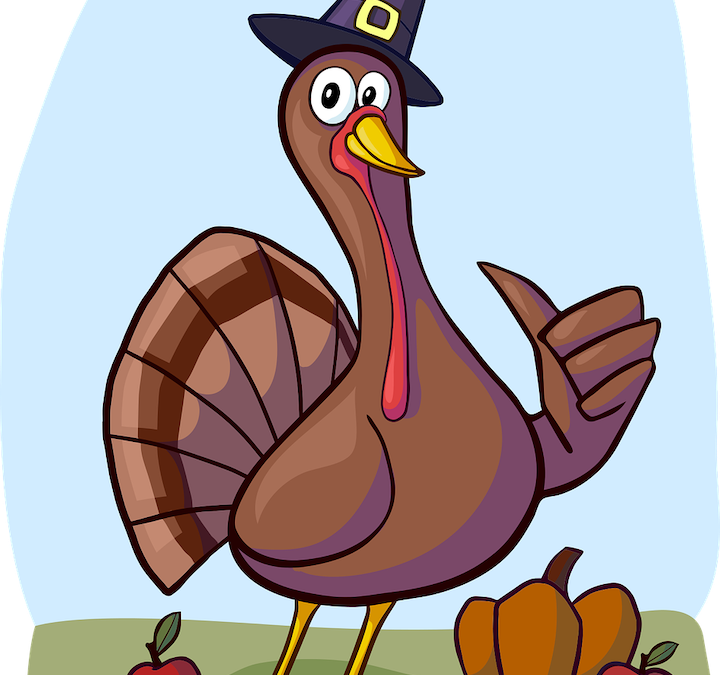
Talking Turkey
By L. Stevens
In a remote, cold country field in the Florida Panhandle, the feathered pastor addressed his wild turkey flock. “In this, the first week of November, we offer our heartfelt prayers for our domesticated cousins, for this is the time of their annual tribulation. Let us bow our beaks and pray, ‘Oh, Heavenly Fowl, we implore thee that the sacrifice of these innocents may, on Thanksgiving Day, heighten the spirit of humble gratitude across this land. Amen’.”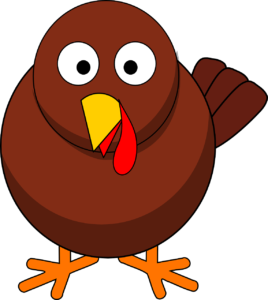
As the service ended, a young poult approached his grandfather. “Poppy, what cousins was the pastor talking about?”
“He spoke of the many descendants of Tom and Henrietta, the first wild turkeys taken into captivity and domesticated, more than 2,000 years ago.”
“What’s that mean, domesticated?”
“Well, son, the humans put them in confinement, and fed them large amounts of grain so they’d be fat, and have sweeter tasting meat. That’s why they’re twice our size. I hate to speak ill of our overweight relatives, but my goodness, they’re enormous.” The old bird knew the curious youngster would learn the facts eventually. Better from him than his friends.
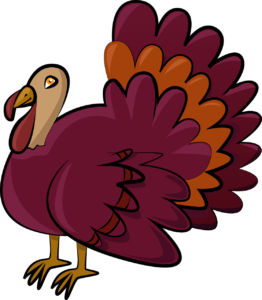
“What’s the deal with people eating turkey on Thanksgiving, Poppy?”
“An unfortunate misunderstanding of history, I’m afraid. The first Thanksgiving was when the Pilgrims, early American settlers, gave thanks to their God for the blessings of their first harvest. Friendly Indians brought deer and there was duck and pheasant for the dinner, but no turkey that day. It’s not clear what inspired the eating of turkeys to give thanks; it certainly caught on in a big way.”
“My friend says the Pilgrims were dumb. Their pants were always falling down, because they wore their belt buckles on their hats.”
“Hah! That’s an old joke.” Poppy went on, “Now, we wild turkeys are blessed. Humans aren’t fond of our gamey meat. Oh, they like to shoot their guns at us, but on the whole they’re poor shots, and not half as smart as we are in the woods. You’ll hear more on this at training camp before the hunting season starts in March. But you asked about Thanksgiving.”
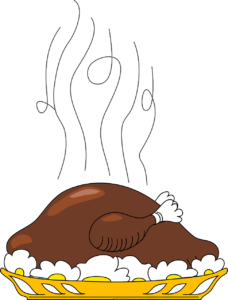 He continued the lesson. “It was a disaster for the descendants of Tom and Henrietta, who are now the main course of most Thanksgiving dinners. On that day, humans stuff themselves with food to the bursting point, then fall asleep afterwards. Before their holiday season is over, many of them will amass a good deal of body weight, I suppose in the manner of our fattened cousins.”
He continued the lesson. “It was a disaster for the descendants of Tom and Henrietta, who are now the main course of most Thanksgiving dinners. On that day, humans stuff themselves with food to the bursting point, then fall asleep afterwards. Before their holiday season is over, many of them will amass a good deal of body weight, I suppose in the manner of our fattened cousins.”
“How do you know all this stuff, Poppy?” the youngster asked.
“I’m the flock’s historian, I suppose. We wild turkeys have quite a history. When they formed the United States, a man named Ben Franklin proposed our species as the national bird. We lost out to the bald eagle, that thieving, carrion-eating degenerate.”
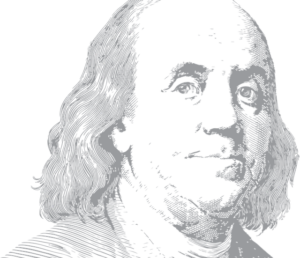
“Yeah, my teacher says the bald eagle is too lazy to fish for himself, he’d rather steal what other birds catch. We got cheated.”
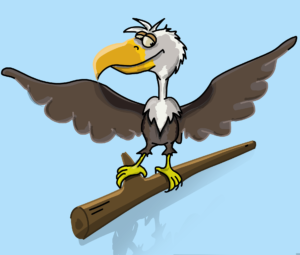 “Well, it’s uncertain Franklin’s proposal was serious. Some say he suggested it to annoy Thomas Jefferson, who wouldn’t eat turkey–it upset his stomach and made him break out in a rash.”
“Well, it’s uncertain Franklin’s proposal was serious. Some say he suggested it to annoy Thomas Jefferson, who wouldn’t eat turkey–it upset his stomach and made him break out in a rash.”
“That wasn’t fair, Poppy.”
“It seems one did not trifle with Jefferson, though some believe Franklin started calling male turkeys ‘Tom’ to rankle him, and it probably did. You see, George Washington, the first president, declared Thanksgiving a national observance, and John Adams continued the tradition. When it was Jefferson’s turn, though, he canceled the holiday. His excuse was, an official day to give thanks to the Creator violated the separation of church and state. But people figured it was because he couldn’t tolerate turkey meat.”
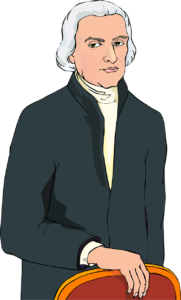
“I’ll bet that made our cousins happy,” the poult exclaimed.
“I suppose—for eight years, anyway.” The wise old bird sighed. “It’s sad, for that’s when they missed their golden opportunity to give up their lazy domesticated lives and join us in the wild.”
The old bird gobbled and commenced to deliver what to older members of the flock was a familiar rant: “They could have exercised, braved the elements, gotten lean and mean, and above all, become tough and gamey. They could have worked like we do to find nourishment, instead of sitting around gorging themselves on free food. But I suppose they were too far gone. They liked the soft life. It doesn’t pay to get soft, youngster.”
“When I grow up, I want to be tough and gamey, Poppy.”
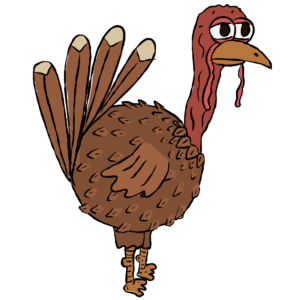
“You shall, my lad. For that I give thanks.”